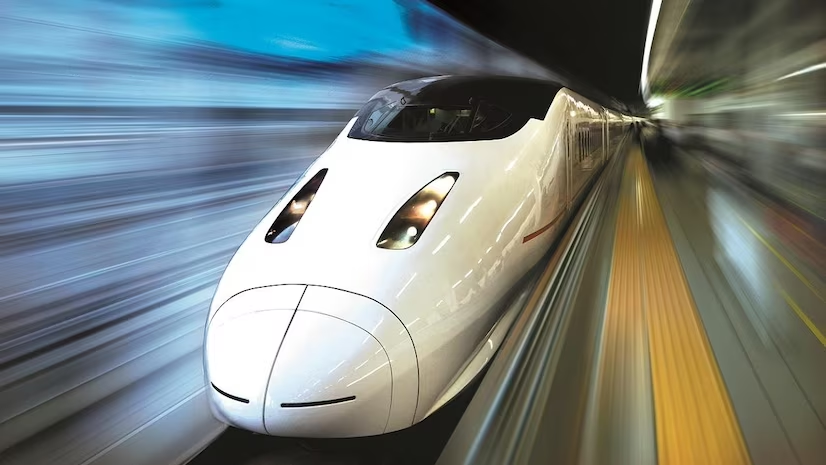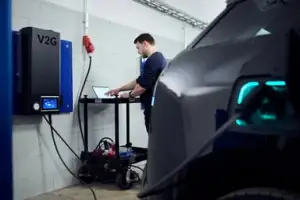Blog By: Priyanka Rana
India Developing Indigenous High-Speed Bullet Trains
India has begun developing an indigenous bullet train that will surpass speeds of 250 kilometres per hour (kmph), making it faster than any existing train on the Indian Railways network.
About Vande Bharat Platform
In the global context, high-speed trains are defined as those capable of traveling at speeds exceeding 250 kmph, such as the French TGV and the Japanese Shinkansen. The Shinkansen E5 series bullet trains, which India plans to deploy on the Mumbai-Ahmedabad route, can reach speeds of up to 320 kmph.
Key Facts about The Vande Bharat Express in India:
- The Vande Bharat Express, also known as Train 18, is an indigenous electric multiple unit (EMU) train developed by the Integral Coach Factory (ICF) in Chennai.
- It is a semi-high speed train with a maximum operational speed of 160 kmph, although it has been tested at speeds up to 180 kmph.
- The first Vande Bharat Express was inaugurated by Prime Minister Narendra Modi on 15 February 2019, running between New Delhi and Varanasi.
- As of April 2023, there are 23 operational Vande Bharat Express trains connecting various cities across India, such as New Delhi, Varanasi, Mumbai, Ahmedabad, Chennai, and Hyderabad.
- The Vande Bharat Express features several modern amenities, including air-conditioned coaches, onboard Wi-Fi, GPS-based passenger information system, automatic doors, and bio-vacuum toilets.
- The train is designed to accelerate from 0 to 100 kmph in just 52 seconds and has a regenerative braking system that can save up to 30% of electrical energy.
- The coaches are manufactured using stainless steel, making them lighter and more energy-efficient compared to conventional coaches.
- The Vande Bharat Express has an aerodynamic design and is equipped with a driver-guard communication system, making it safer and more efficient.
- In the Union Budget 2022-23, Finance Minister Nirmala Sitharaman announced that 400 new Vande Bharat trains would be manufactured and introduced over the next three years.
- The Vande Bharat Express has been well-received by passengers for its comfort, speed, and modern amenities, and has become a symbol of India’s progress in the rail sector.
Manufacturing Technology For Project
The Vande Bharat trains are manufactured by the Integral Coach Factory (ICF) in Chennai. The made-in-India bullet trains will operate on the recently announced north, south, and east corridors. These corridors will utilize more Indian technology and domestic manufacturing, complementing the western corridor developed in collaboration with Japan.
Mumbai-Ahmedabad High Speed Rail Project
India is currently relying on Japanese technology for the bullet trains that will operate on the Ahmedabad to Mumbai line, which is currently under construction. The Japan International Cooperation Agency (JICA) is providing a soft loan of approximately ₹40,000 crore for the Mumbai-Ahmedabad High Speed Rail project, with the total project cost exceeding ₹1.08 lakh crore.
The National High Speed Rail Corporation Limited (NHSRCL), responsible for implementing India’s first bullet train project, recently announced the completion of 300 km of pier work. The land acquisition process for the entire 508 km stretch was finalized in January 2024.
About The National High Speed Rail Corporation Limited (NHSRCL)
The National High Speed Rail Corporation Limited (NHSRCL) is a government-owned entity responsible for implementing India’s first bullet train project between Mumbai and Ahmedabad.
- Established in 2016 under the Companies Act, 2013
- Mandated to develop, construct, and operate high-speed rail projects in India
- Implementing the 508 km Mumbai-Ahmedabad High Speed Rail Corridor
- Utilizing Japanese Shinkansen technology and funding from the Japan International Cooperation Agency (JICA)
- Aims to revolutionize intercity travel and boost economic development
Priyanka Rana Blogs
Source Credit: GKToday

18
AprIndia Developing Indigenous High-Speed Bullet Trains
Apr 18, 2024Recent Blog
The TechKritiApr 26, 2025
India’s First Quantum Computing VillageApr 24, 2025
India’s Achievement In QKDApr 22, 2025
The V2G TechnologyApr 21, 2025
Country’s Specific Domain By GoogleApr 19, 2025




